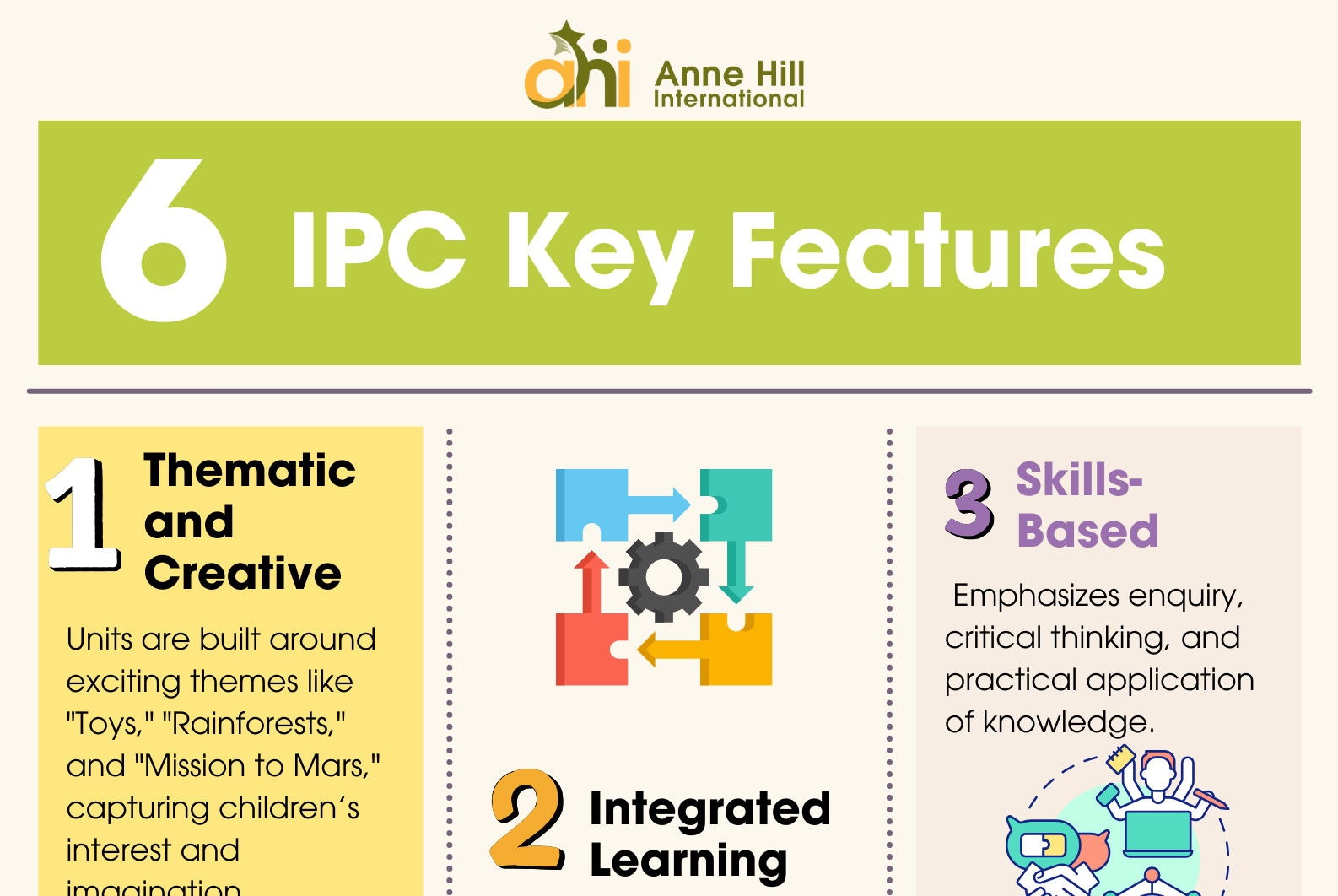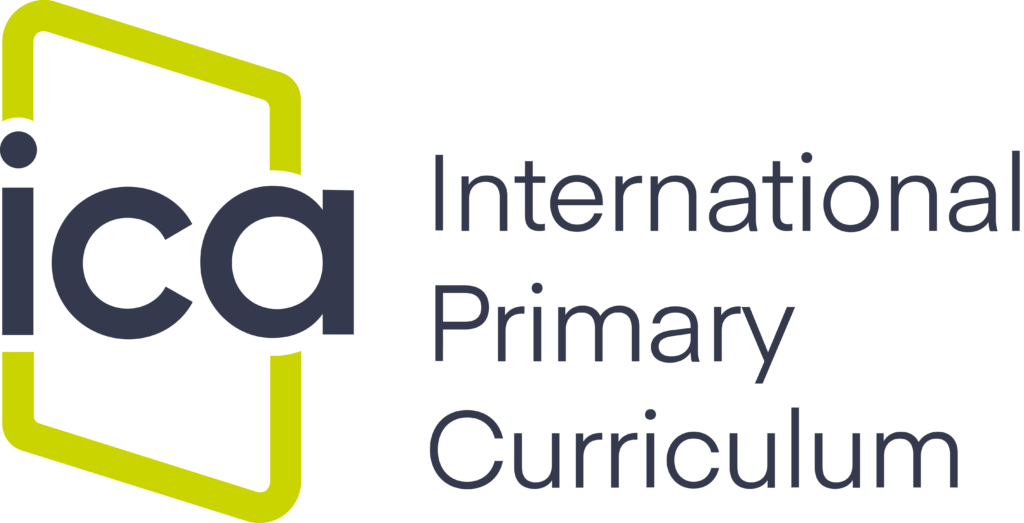
This guide introduces the International Primary Curriculum (IPC), a globally recognised framework designed to enhance your child’s learning journey. We delve into its philosophy, structure, and unique features, providing practical advice to help you actively engage in your child’s education.
Il panorama del gioco digitale in Italia è cresciuto in modo significativo negli ultimi anni, attirando l’attenzione di utenti sempre più interessati a piattaforme affidabili e ben strutturate.
Informarsi prima di scegliere dove giocare è fondamentale, soprattutto quando si parla di sicurezza, trasparenza e qualità dell’esperienza complessiva.
Proprio per questo motivo, molte guide e portali dedicati ai casino online italiani aiutano gli utenti a orientarsi in un mercato ampio e in continua evoluzione.
Uno degli aspetti più apprezzati dai giocatori italiani è la possibilità di trovare informazioni chiare su bonus, promozioni e condizioni di utilizzo.
Capire come funzionano i requisiti di scommessa e quali giochi contribuiscono realmente al completamento delle offerte evita sorprese spiacevoli.
Un altro elemento centrale è la varietà dei giochi disponibili, che spazia dalle slot moderne ai classici da tavolo come roulette e blackjack.
Le piattaforme più curate propongono anche sezioni live con croupier reali, creando un’atmosfera simile a quella di un casinò fisico.
La qualità del software gioca un ruolo decisivo, poiché influisce sulla fluidità del gioco, sulla grafica e sull’esperienza complessiva dell’utente.
Molti giocatori italiani prestano grande attenzione anche ai metodi di pagamento, preferendo soluzioni rapide, sicure e ben conosciute.
Carte, portafogli elettronici e sistemi digitali moderni rendono depositi e prelievi più semplici e veloci.
Un servizio clienti efficiente rappresenta un ulteriore punto di forza, soprattutto quando è disponibile in lingua italiana.
Poter contare su un’assistenza chiara e reattiva aumenta la fiducia nella piattaforma e migliora l’esperienza di gioco.
Non meno importante è il tema del gioco responsabile, che oggi occupa un ruolo centrale nel settore.
Le piattaforme più serie offrono strumenti di autolimitazione, pause di gioco e informazioni utili per mantenere il controllo.
Questo approccio aiuta i giocatori a vivere il gioco come una forma di intrattenimento e non come un rischio.
Anche l’accessibilità da dispositivi mobili è diventata essenziale, considerando quanto spesso si utilizzi lo smartphone.
Interfacce ottimizzate e tempi di caricamento rapidi rendono il gioco più piacevole ovunque ci si trovi.
Nel complesso, scegliere con attenzione dove giocare significa puntare su qualità, sicurezza e trasparenza.
Con le giuste informazioni, ogni utente può trovare una piattaforma adatta alle proprie esigenze e al proprio stile di gioco.
What is the IPC?
The IPC is a child-centred, internationally recognised curriculum for children aged 5–11. It emphasises thematic, engaging, and integrated learning experiences while fostering personal and international understanding.
Key Features
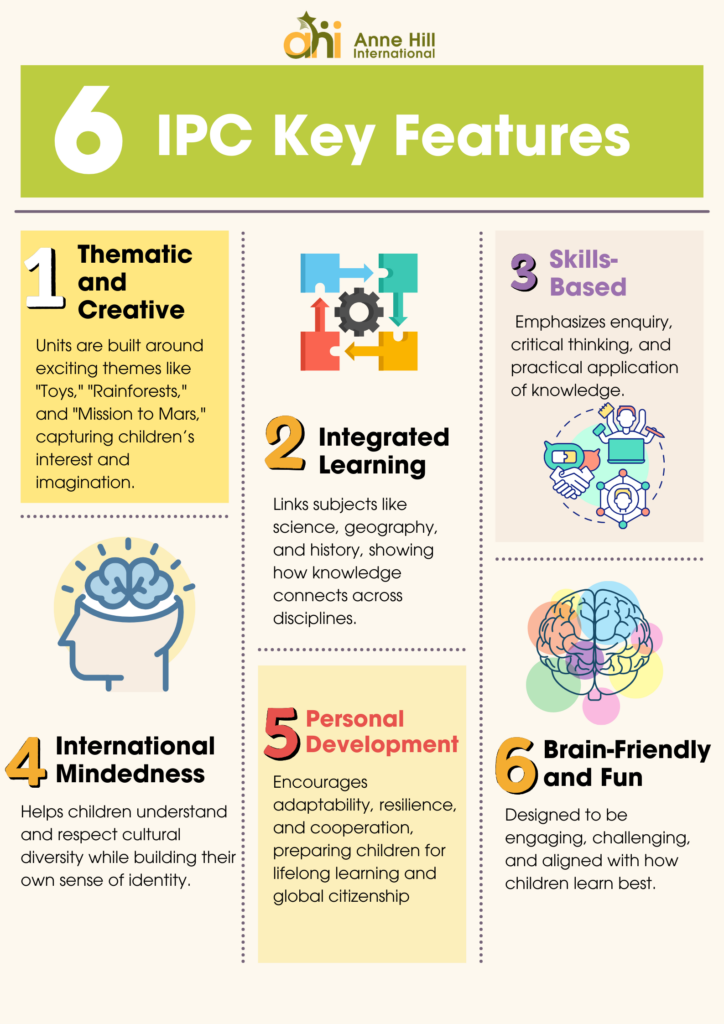
- Thematic and Creative: Units are designed around captivating themes like “Toys,” “Rainforests,” and “Mission to Mars,” sparking children’s curiosity and imagination.
- Integrated Learning: Subjects such as science, geography, and history are interconnected, helping children see how knowledge aligns across disciplines.
- Skills-Based: Focuses on enquiry, critical thinking, and the practical application of knowledge.
- International Mindedness: Encourages respect for cultural diversity while helping children build their sense of identity.
- Personal Development: Instills adaptability, resilience, and cooperation, preparing students for lifelong learning and global citizenship.
- Brain-Friendly and Fun: Lessons are engaging, challenging, and tailored to how children learn best.
Diagram Idea: Visual representation of the IPC pillars: Academic, Personal, and International Learning.
Why Choose?
The international Curriculum (IPC) aligns with our school’s mission to nurture lifelong learners who excel academically, socially, and emotionally. It combines academic rigour with personal growth and global perspectives.
Benefits
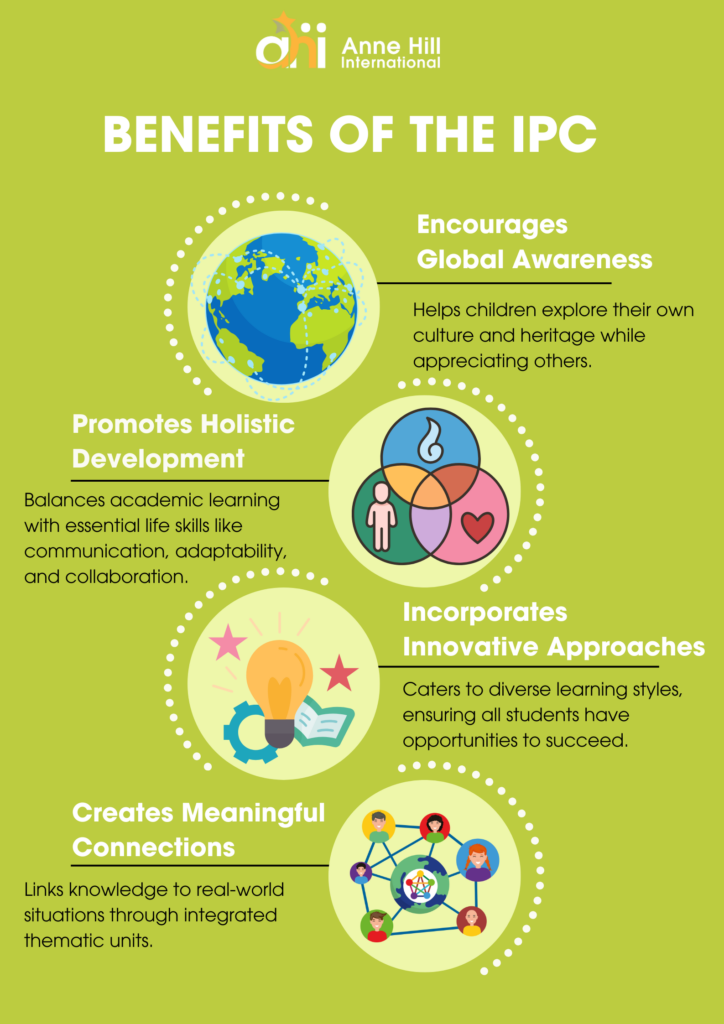
- Encourages Global Awareness: Helps children explore their own culture and heritage while appreciating others.
- Promotes Holistic Development: Balances academic learning with essential life skills like communication, adaptability, and collaboration.
- Incorporates Innovative Approaches: Caters to diverse learning styles, ensuring all students have opportunities to succeed.
- Creates Meaningful Connections: Links knowledge to real-world situations through integrated thematic units.
Learning Goals
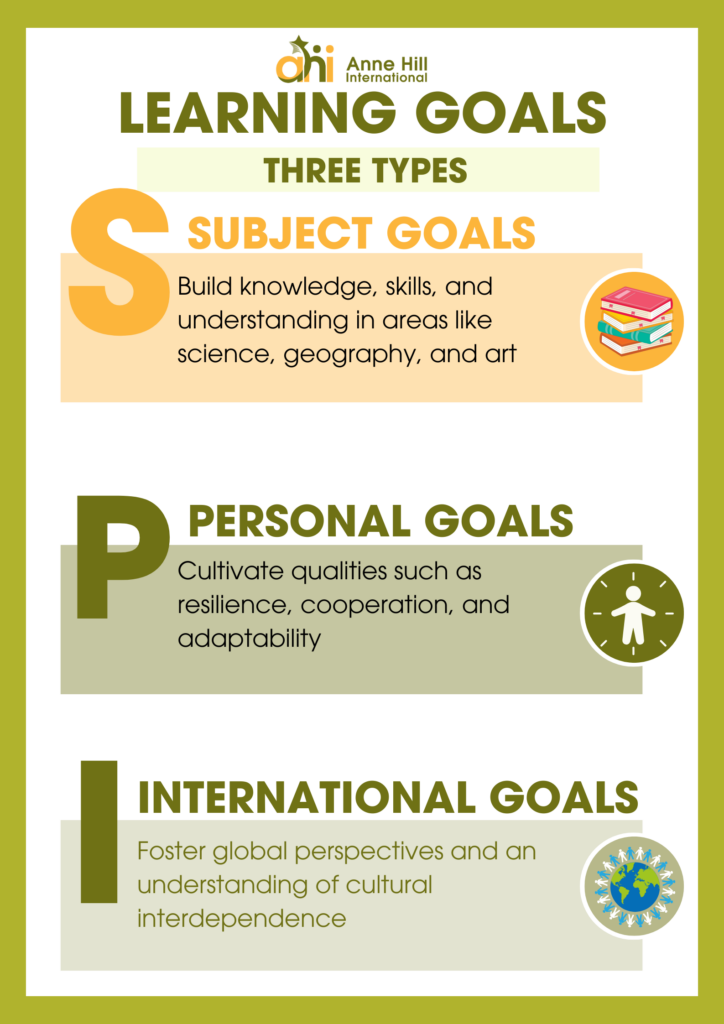
Each Milepost encompasses three types of goals:
- Subject Goals: Build knowledge, skills, and understanding in areas like science, geography, and art. Example: Create maps using pictures and symbols (Geography).
- Personal Goals: Cultivate qualities such as resilience, cooperation, and adaptability. Example: Demonstrate resilience by trying again after failure.
- International Goals: Foster global perspectives and an understanding of cultural interdependence. Example: Identify cultural differences and value them equally.
How Do IPC Units Work?
Each International Primary Curriculum (IPC) unit follows a structured approach to guide children’s learning:
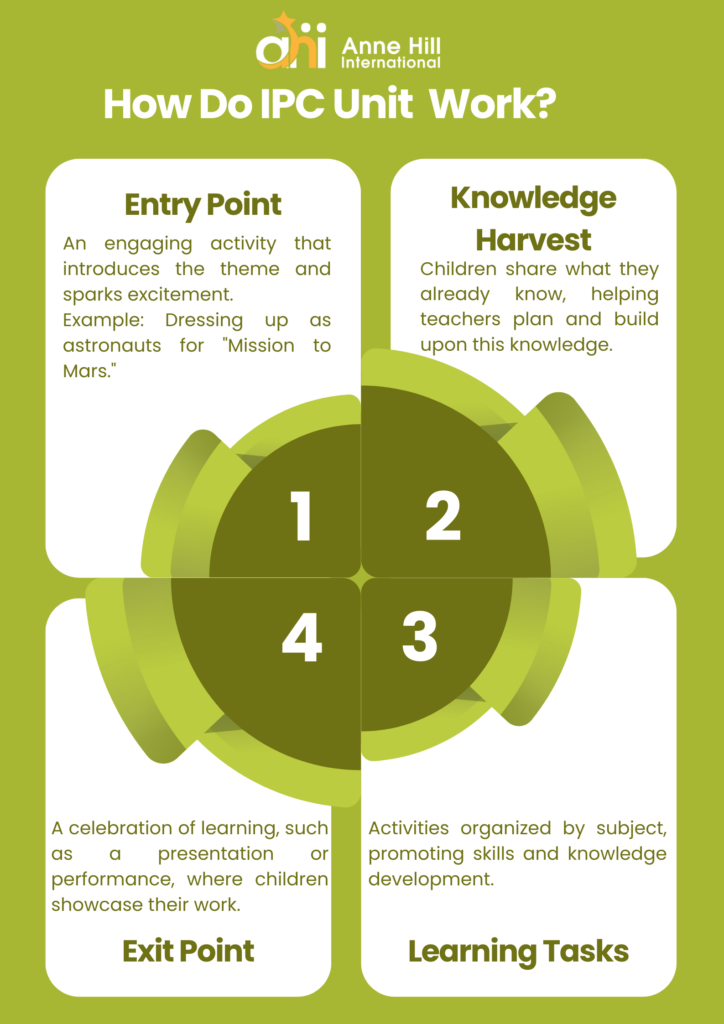
Key IPC Terms:
- Entry Point: A creative start to the unit, often involving hands-on activities.
- Knowledge Harvest: Reflective activities to uncover prior knowledge and guide new learning.
- Exit Point: Culminating events showcasing children’s learning to families.
Assessment in the IPC
The IPC employs a skills-based assessment framework, focusing on children’s developmental stages:
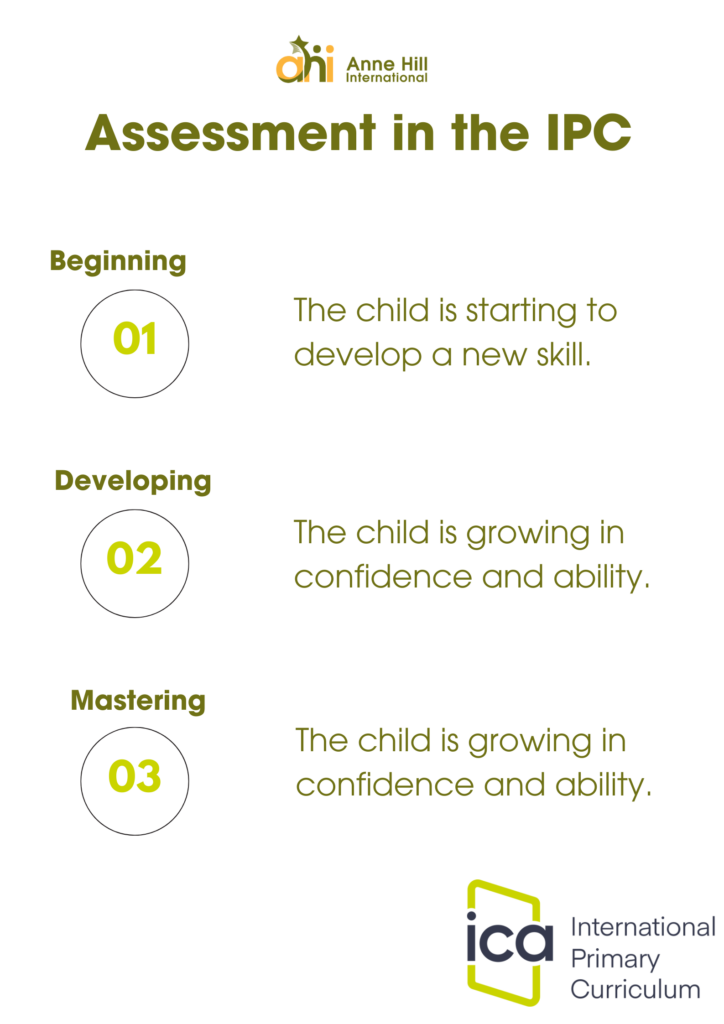
Features of IPC Assessment
Encourages self-assessment to foster motivation and understanding.
Evaluates key subjects such as science, geography, history, ICT, and international mindedness.
Diagram Idea: A chart showing the progression from Beginning → Developing → Mastering.
How Can Parents Support IPC Learning?
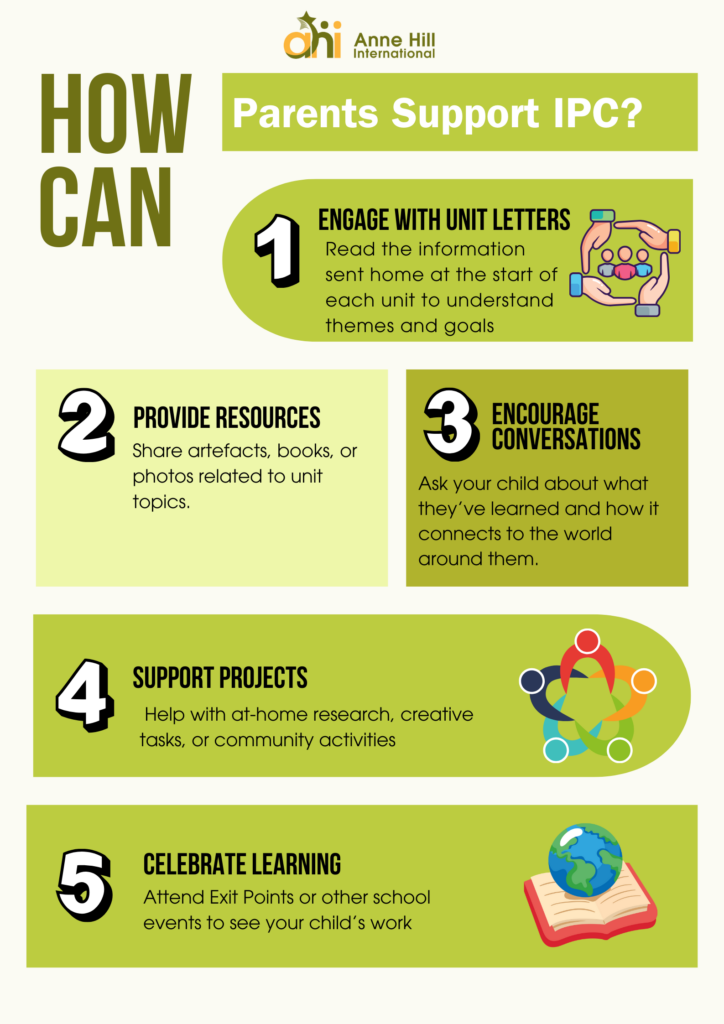
Subject Highlights
Art: Children receive 1–2 hours per week of art, integrated into IPC themes. Lessons foster creativity while achieving subject and personal learning goals.
Music: Weekly music lessons enhance teamwork, memory, and abstract thinking, guided by the IPC and National Curriculum (England).
PE: Children participate in 1–2 hours of physical activity weekly, promoting health, fitness, and resilience.
Our curriculum: Curriculum
Useful Resources for Parents
International Primary Curriculum (IPC) Official Website: (https://internationalcurriculum.com/)
School Resources: Keep an eye out for unit letters and school updates to stay informed.
The IPC transforms education into an exciting, engaging, and globally relevant journey for your child. By partnering with teachers and supporting your child’s learning at home, you can help them unlock their full potential.


